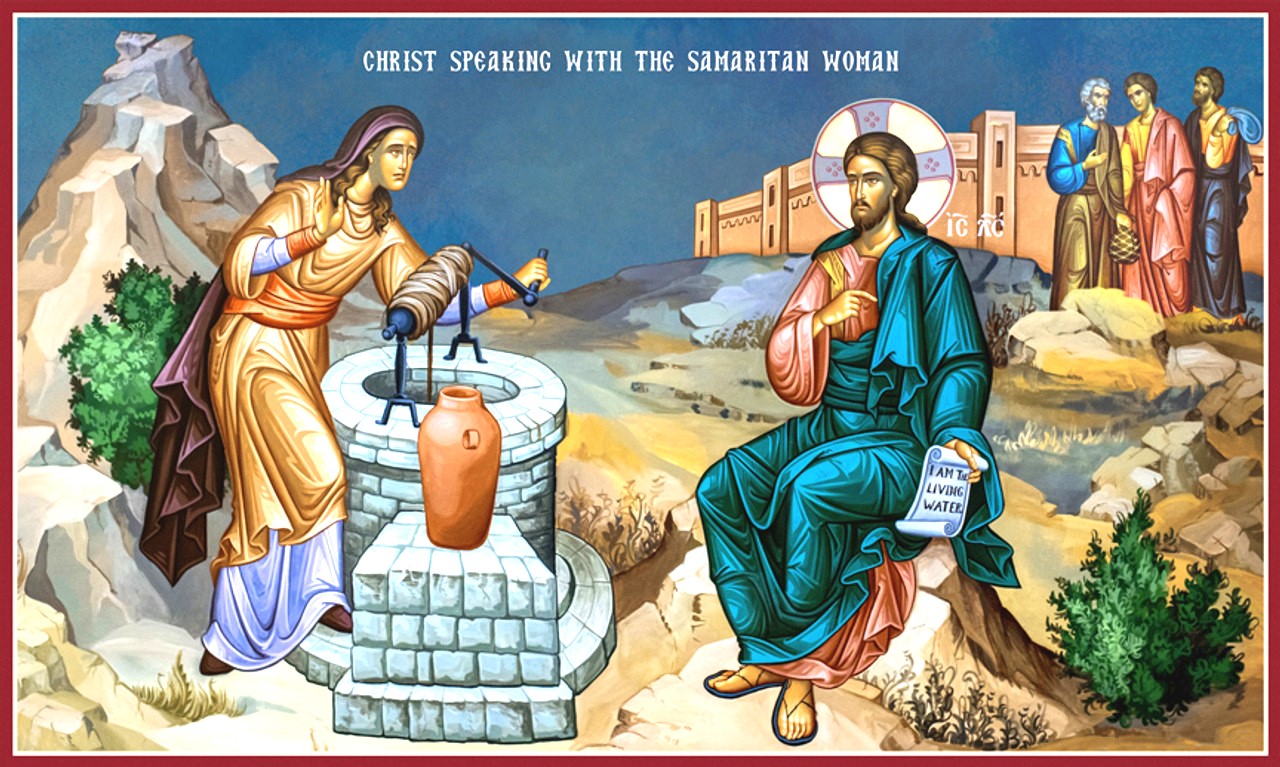- Home
- About us
- Students
- Courses
- Research
- Library
- News & Events
- Gallery
- Contact
- Our Blog
Latest News

Sunday of the Samaritan Woman:
A Reflection on the Gospel Reading (Jn 4:5-42)

by Assoc. Professor Philip Kariatlis (Sub-Dean)
In the Orthodox Church, this Sunday—known as the fifth Sunday of Pascha—the Church, in her sacred wisdom, sets before us the Gospel of the Samaritan Woman. In the Gospel reading, we behold a remarkable encounter—an encounter of divine condescension and human transformation: a sacred dialogue between our Lord Jesus Christ and a woman of Samaria. It is one of the longest recorded conversations in the Gospels, and it is a dialogue that unfolds not merely in words, but in an outpouring of divine Grace.
Christ draws near to a soul deeply wounded by sin, weighed down by shame, and estranged from the covenant of Israel. Yet, in speaking with her, Christ does not condemn her; rather, He gently awakens her thirst for truth, heals her woundedness, and illumines her with the light of divine knowledge. In this encounter she is ultimately transformed from being woman weighed down by suffering to a sanctified soul; from an outcast to an evangelist; and from one who once dwelt in the shadows of broken relationships, to one who becomes a witness to the Light of the world.
It is precisely for this reason that in the sacred tradition of the Church, she is known by a name both luminous and profound: Ἁγία Φωτεινή—Saint Photini, the Enlightened One. Such is the ineffable mercy, the fathomless compassion, and the transforming love of our Lord Jesus Christ. He takes what is broken and restores it. He takes what is unclean and hallows it. He takes what is ordinary and transfigures it into a vessel of divine glory.
But why, might we ask, does the Church present us with this Gospel during this Paschal period—more precisely, midway through the bright and joyous Paschal season, in the sacred span between the Resurrection and Pentecost? Indeed, at first glance, the narrative seems distant from the themes of the Resurrection or the descent of the Spirit on the day of Pentecost. Yet, the Church, with motherly discernment, places this encounter before us as a mystical bridge—a spiritual preparation for Pentecost.
For what does the Lord offer the Samaritan woman? He offers her ὕδωρ ζῶν—living water. And what is this living water, if not the grace of the Holy Spirit? The Holy Fathers teach us that water, especially in the Johannine writings, often signifies the Holy Spirit. Thus, when Christ says, “The water that I will give will become in them a spring of water gushing up to eternal life” (John 4:14) He speaks of the Spirit—the Spirit of truth, the Comforter, the Giver of life, who will be permanently poured out upon the Church on the day of Pentecost.
It follows therefore that the Gospel is not merely a personal conversion story. It is a prophetic revelation: a foretaste of that living fountain which would be opened to all humanity, when the Spirit descends “as a rushing mighty wind” upon the Apostles. In a hymn chanted during the Vespers of this great feast, we sing: “The middle of the days is here, beginning with the saving Resurrection and sealed by the divine Pentecost.” We stand at the midpoint between Pascha and Pentecost—having received the joy of the empty tomb and now awaiting the fire of the Upper Room and the ‘living water’ that will be poured out upon the entire world.
In this sacred interval, the Church bids us to thirst—for something more, something deeper: for the fullness of the Spirit, for the “life-giving gift of God”—or as we say in a well-known prayer, “the Giver of Life [ζωῆςχορηγός]” that Christ offers to the seeking heart.
Upon further reflection of the Samaritan woman’s encounter with Jesus Christ at Jacob’s well, we are told, in the Gospel, that our Lord, wearied by His journey, decideσto rest by the ancient well of the Patriarch. His disciples had gone into the city to purchase food. And in the quiet solitude of that hour, a woman approaches—alone, burdened by her past, coming to draw water under the heat of the midday sun.
We are further told that Jesus Christ, ever the Good Shepherd, sees not the shame in this woman but her future potential. He initiates a conversation—not with condemnation, but with a simple request: “Give Me to drink.” Yet in this moment, He is already preparing to give her infinitely more—to offer her not merely well-water, but living water; not merely refreshment, but renewal; not merely knowledge, but the very Source of life.
He speaks to her of her own life—not to expose her, but to heal her. With divine discernment and tender delicacy, He uncovers the truth of her relationships: “You have had five husbands, and the one you now have is not your husband.” He touches the wound, but only to cleanse it.
He unveils her heart, not to shame her, but to sanctify her. And when she begins to thirst—not for earthly water, but for the water of the Spirit—then, and only then, does He reveal Himself plainly: “I who speak to you am He”—the Christ, the long-awaited Messiah.
It is of utmost importance to underline that this encounter is in no way unique to the Samaritan woman. It is the pattern of every true meeting with Christ, for all of us throughout time. Before we can drink of the living water, we must first come to terms with the truth of our own lives. Before grace can fill us and thoroughly permeate all of our existence, our hearts must be emptied of illusions and of our often-false sense of self. Like St Photini, we too must come to the well—carrying the jars of our burdens, our sins, our unmet longings—and there, in the stillness, allow Christ to speak.
And this, is in no way an easy thing. It takes an immense amount of courage and much trust in our Lord to admit our flaws and shortcomings. Indeed, we often prefer to live with distractions rather than face the silence and reality of our true self. We cling to patterns of life that leave us empty, anxious, and alone, rather than admit our thirst. We resist the truth, because we fear it will undo us—which indeed it will but only to fill us with the delight, the joy and true satisfaction of His loving Grace. Christ does not come to undo us so as to destroy us. Quite the contrary, He comes to re-create and re-fashion the genuine human person within. He does not come to punish, but to pardon; not to wound, but to wash; not to cast us aside, but to draw us close and to pour into us the joy of His Spirit.
And so, as we continue to journey toward the radiant feast of Pentecost, we are reminded to emulate Saint Photini; to thirst for Christ; to seek His mercy; to us desire—above all things—the living water of the Holy Spirit. And, upon, having received all these gifts, to live our life in gratitude in response to all that our Lord has bestowed upon humanity—namely a means to become partakers of His eternal beatitude. For this reason, our prayer ought to be one that invites God’s illumination so that we may truly come to know ourselves; that we may repent sincerely; that we may learn to trust and love God fervently; and that we may be filled with His gifts: the gifts of the joy, peace, freedom and the love of the Holy Spirit. In seeking these things, we do more than respond to the deep, existential longing for meaning within every human heart; we move toward the promise that our loving Lord will grant us to dwell forever in that eternal communion with Him who is Life Himself.



.png)